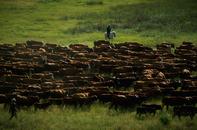
Boer-Ndebele War of 1883
During the 20th century, large-scale changes in white agriculture caused the Ndebele farm tenants to be put under ever-increasing pressure. In some cases, the farmer would mechanize and, no longer requiring the service of semi-feudal labourers, would simply evict the family. In other cases, the farmer gradually increased the amount of time which young men had to spend working on the farm, causing many Ndzundza sons to run away.
With the family no longer able to fulfil its labour service, the man's parents and sisters would then be driven off the farms, and the family as a whole would have to find a new place to live. Both of these scenarios saw numbers of Ndzundza - often accompanied by the herds of cattle they had built up - looking for new places to settle. They moved either to the newly formed homeland of KwaNdebele or to the older - Northern Sotho - homeland of Lebowa.
Many critics saw KwaNdebele as the ultimate 'dumping ground', and regarded its 'Chief Minister' and his sinister henchmen as stooges of the apartheid government. But it was to be the scene of an incident hardly less dramatic or definitive than the Boer-Ndebele War of 1883. During the darkest days of apartheid, in the late 1980s, there erupted a wave of popular resistance, supported by the then ruling Ndzundza king, against the repressive officials of the KwaNdebele government.
Such was the support enjoyed by this uprising that it successfully quelled all suggestions of KwaNdebele 'independence' under apartheid. The Ndebele had shown, and continue to show, that traditionalism is not as rigid as it might appear, and that royalist attitudes can be invoked in the service of a representative democracy.